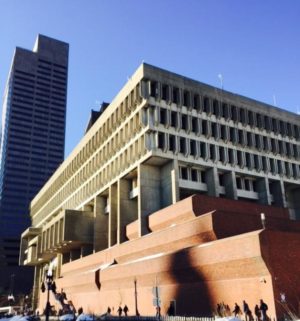Boston Mayor Michelle Wu says the city will be filing a home rule petition today to join the state’s new pilot program for communities seeking to ban natural gas hookups in new construction and major renovations.
“Our community members deserve to work, learn and live in spaces that are healthy, energy efficient and save money on utilities costs,” she said at a press conference on City Hall Plaza Tuesday morning, noting that buildings were one of the largest sources of greenhouse gas pollution in Boston.
The gas ban pilot was included in a major climate package signed by Gov. Charlie Baker last week. It allows 10 communities to ban the use of fossil fuels in new residential and office construction as a way to prove out techniques and building costs associated with all-electric building systems. All-electric buildings substitute heat pumps for natural gas-powered water heaters and heating and air conditioning systems, and induction cooktops for gas-powered ones.
The state Department of Energy Resources is expected to write regulations in the coming weeks that will determine how far along a development can be in its planning process before it will be exempted from the ban.
State Rep. Jeff Roy, the House chair of the state legislature’s key climate committee, told reporters Tuesday that no community has yet filed a home rule petition under the new pilot program. The city of Cambridge, along with wealthy suburbs like Arlington, Lexington and Newton, are widely expected to apply, although some may not be admitted to the program based on affordable housing production requirements.
“Your announcement today is bold, creative and energizing,” Roy said. “The 10-community pilot program will offer valuable and robust data associated with electrification.”
Boston Planning & Development Agency Director Arthur Jemison said the gas ban would work in tandem with new net zero carbon building standards being developed in collaboration with real estate lobby group NAIOP-MA and business-backed group A Better City.
“These are critical steps to the city’s goal of becoming net zero carbon by 2050,” he said.
Real Estate Industry to Get Voice in Rules
After the home rule petition is filed, the city will begin crafting its local fossil fuel ban ordinance.
Chief of Housing Sheila Dillon pledged that the city will work with developers to write the law, noting that her Office of Housing was already requiring new affordable developments in the city to be all-electric.
“There is not one developer or lender in Boston that doesn’t realize climate change is real and will get worse if we don’t take deliberate action,” she said.
Wu’s office said in a statement that the final ordinance would be written over a “months-long community process” with input from an advisory “made up of stakeholders with expertise in environmental justice, affordable housing, labor and workers’ rights, building engineering and energy, healthcare and public health, real estate development and management, architecture and urban design, and distributed energy systems.” The process will establish definitions, criteria for applicability and determine how to balance the city’s drive to decarbonize buildings, keep housing affordable and make sure workers who work on and install on natural gas building systems don’t lose their jobs.
“NAIOP is pleased to hear that the Wu Administration plans to work with the real estate development industry and NAIOP to discuss how a fossil fuel ban would be implemented in Boston,” NAIOP-MA CEO Tamara Small said in an email. “NAIOP’s members continue to lead the way in building resilient projects that bring housing and jobs to the region. The real estate development community is committed to tackling climate change – a threat to the environment, economic development, and public health – and we look forward to participating in the stakeholder process.”
Affordability Concerns Remain
Still, questions linger over the impact of Boston joining the ranks of wealthy suburbs that have already expressed interest in banning new natural gas hookups within their borders.
In her remarks, Wu echoed claims that all-electric buildings will be cheaper or comparable to existing fossil fuel-powered ones.
The pilot program’s backers on Beacon Hill cited Baker administration research focused on small multifamily buildings to claim that all multifamily buildings would cost the same or less to build and operate than natural gas-fueled ones, thanks in large part to rebates for electrically-powered HVAC equipment.
But during the debate over the pilot program on Beacon Hill, real estate lobby groups raised strong concerns that the bans will in essence be a back door to severely curbing multifamily development due to what they characterized as increased costs associated with all-electric development.
“While we share and admire Mayor Wu’s dedication to combating climate change, we are deeply concerned by fully banning fossil fuels from new construction and the negative impacts such a blunt change will have on the critical need for housing production,” Greater Boston Real Estate Board CEO Greg Vasil said in a statement issued by a spokesperson. “Instead of taking part in the state’s pilot program to ban fossil fuels in new developments, we believe the city and state should await the results of the pilot program before considering if and how Boston may implement this ban.”
A Better City said developers are facing a “dizzying compliance patchwork” of initiatives aimed at curbing buildings’ carbon emissions.
“We urge Mayor Wu to prioritize engagement with stakeholders from the real estate and development community to ensure that the phase-out of fossil fuels is both technically and financially feasible in terms of building construction and operations and grid capacity and reliability, while being clear on timing and implementation,” the group said in a statement.
Boston is one of a small group of municipalities in Massachusetts that builds the majority of the state’s new multifamily housing.







